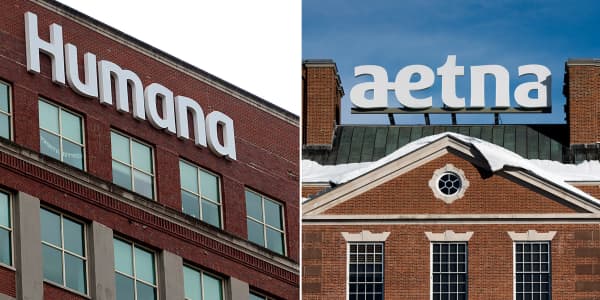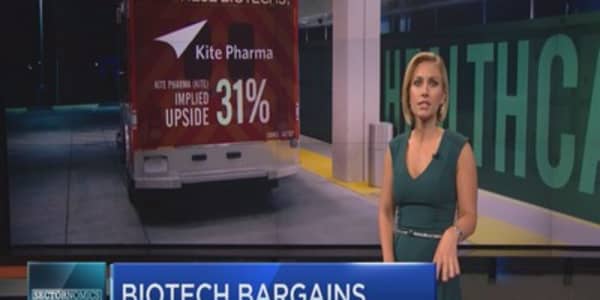Obamacare may not have played as great a role on Election Day as predicted, but President Obama's signature legislation has assumed a larger than anticipated role somewhere else this fall: health-sector stock performance.
As third-quarter earnings reports roll in, the improvement in profits that hospitals and insurance companies attributed to the law three months ago as being maybe no more than a one-time pop are looking more durable.
"People are coming around to the idea that maybe it's good,'' said Les Funtleyder, portfolio manager at New York hedge fund Esquared Asset Management and a former Wall Street health-care analyst. "Maybe it's not a flash in the pan but a theme going forward."
At HCA, the nation's largest hospital chain, executives estimate that the law accounted for about a third of and as much as 4 percent of the company's adjusted income. King of Prussia, Pennsylvania-based Universal Health Services said the law might account for 40 percent of profit gains. And LifePoint Hospitals, which has 68 mostly rural locations in 21 states, said by $12 million, more than half of its overall gain, and will add as much as $50 million to profits for the year.
Read MoreWhy Warren Buffett is always betting on bank stocks
The law is boosting hospital profits for two simple reasons, according to comments from HCA CEO Milton Johnson in a conference call with analysts: It's delivering more patients to the company's 280 hospitals and surgery centers, and fewer of them lack insurance.
A more crowded waiting room
People who bought insurance through Obamacare exchanges accounted for 7,800 hospital admissions and 27,000 emergency-room visits during the quarter, HCA estimated. The chain also saw a 56 percent drop in the number of patients who were uninsured in states that expanded Medicaid under the law, after an estimated 10 million Americans either bought new insurance at the online exchanges or obtained new Medicaid coverage.
HCA said 44 percent of its patients who purchased coverage on Obamacare-related exchanges, such as healthcare.gov, had no coverage before.
The numbers are similar elsewhere. LifePoint who were paying their own bills, and a 22 percent drop in self-paid emergency room visits, CFO Leif Murphy said.
"The impact of the Affordable Care Act is estimated to have contributed approximately 40 percent of [our] volume growth," Tenet Healthcare said in a statement.
If you go from 18 percent uninsured to 13 percent, that's pretty big. And most of that flows to the bottom line.Brian TanquilutJefferies analyst
Some hospitals say they can separate the law's impact on profits from those of the improving economy, which also helps people get more access to health care and makes them more willing to pay for their own share of discretionary procedures.
The ACA's impact is about the same as the effect of a better economy, said Universal Health Services CFO Steve Filton. Each was responsible for about 35 percent to 40 percent of the company's gain in profit this quarter.
"It certainly appears as if the growth rate that we realized in the third quarter … was still very strong," Filton said, though he added that growth was even greater in the second quarter. "This seems to us to be sort of a more sustainable rate going forward."
Read More Is obesity the best bet in America?
LifePoint received a bigger bump from the ACA than some rivals, because rural communities it serves have seen a less-robust recovery this year than urban markets, where HCA, Tenet and Community have a bigger presence, said Jefferies analyst Brian Tanquilut.
Obamacare's impact can also be seen in the wider profit margins that hospital chains have reported. Because the law is designed to contain costs as well as give insurance to more people, hospitals and other health-care providers are merging to build up scale.
"We have had a lot of overcapacity in hospitals," Tanquilut said. "You don't have to hire many more nurses if you raise occupancy. And hospitals have been buying medical devices at better prices because they are bigger."
On Monday, Franklin, Tennessee-based Community Health Systems said it earned $62 million, or 54 cents a share, on third-quarter sales of $4.8 billion that, like Tenet's, were .
Between them, the five major hospital chains own or manage 534 U.S. hospitals, according to their federal securities filings. That's half of the 1,068 for-profit U.S. hospitals reported by the American Hospital Association.
Public policies
For health insurers, the impacts of ACA on earnings have been more subtle but also positive. Insurers' reports have been mixed overall, but nearly all the majors are reporting that Obamacare is a primary driver of their new member growth—some pointed out that taxes under the new law are reducing profit margins.
In some cases, contrary to predictions by the law's opponents, customers who bought private insurance through healthcare.gov and online exchanges run by states have proved more likely to pay their bills and less likely to cancel their policies this year than other clients who buy individual insurance, rather than getting coverage through employers' group plans.
A quarter ago, Aetna said Obamacare had little impact on earnings. This quarter "we're finding the public market right now is more stable than the off-exchange individual market," said Aetna CEO Mark Bertolini during conference call. The private individual insurance market "has a lot of turnover, and every year almost a third of it turns over,'' he added.
At Cigna, expected losses on policies sold through the exchanges haven't materialized, while the company is losing money on its other individual-policy clients, CEO David Cordani said last Thursday during conference call. About 3 percent of Cigna's business now comes from the individual business.
Nevertheless, UnitedHealth said profit margins have been hurt by Obamacare-related taxes. And some managed-care companies, notably Wellpoint, in some plans sold to small businesses, which may reflect a decision to give workers cash to buy their own coverage instead. But Wellpoint's 1.4 million new customers from expanded Medicaid and the exchanges are more than the 300,000 lost in the small-group business, and the new clients are costing less than expected, said CFO Wayne de Veydt in discussion with Wall Street analysts.
"We expected the cost trends on exchange business to be much higher than cost trends we have on our non-exchange business, and that is proving to be true, but it is proving to be less than we had expected," de Veydt told analysts.
Meet the new boss—same as the old boss?
In 2015, the industry is looking to add as many as 5 million newly-insured customers through the Obamacare exchanges, relying on projections by the Congressional Budget Office. But the most important prize may be delivered if more states choose to use federal money available under the law to expand state-run Medicaid programs.
Pennsylvania has committed to Medicaid expansion next year, and other candidates to expand include big prizes, like Florida and Tennessee. That led to an awkward interlude of HCA's analyst call, where senior vice president Victor Campbell could have been perceived as rooting against HCA co-founder Rick Scott's reelection as Florida's governor before correcting himself.
"Florida, we'll just have to wait post-election and see what happens in terms of the new governor and in terms of the state legislature," Campbell said. "And again I say 'new governor,' whether it's the existing governor or a new governor, I think both support it. So the question is really the legislature down there."
Campbell is correct that Scott, a Republican who narrowly defeated Democrat Charlie Crist, supports expanding Medicaid. Florida's GOP-controlled legislature has refused to accept the federal money.
"If you go from 18 percent uninsured to 13 percent, that's pretty big," Tanquilut said, citing nationwide data. "And most of that flows to the bottom line."





